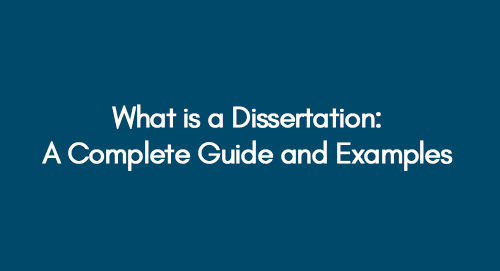
2 Creative Fine Art Dissertation Examples For Inspiration
November 28, 2022
Top 2 Philosophy Dissertation Examples to Inspire Students in 2025
November 28, 2022A dissertation is a detailed research paper that presents an original argument on a specific topic, usually required for a PhD or other advanced degrees. Its main purpose is to contribute new knowledge or insights to a field through careful research and analysis. A dissertation requires thorough planning, critical thinking, and strong writing skills.
130+ Latest Education Dissertation Topics in 2025
To help you with your dissertation writing, we provide examples that can serve as inspiration. You can explore our MA Dissertation Examples for Guidance to better understand structure, research methods, and writing styles.
Example: 1 An Investigation of Cyberbullying and Its impact on Adolescents’ Mental Health
Example: 2 How (NPPF) Can Contribute in Creating a Sustainable and Healthy Community
Essential Guidelines for Writing an MA Dissertation
Writing a Master's (MA) dissertation is a crucial step in academic research that requires careful planning, critical thinking, and structured writing. Below are essential guidelines to help students successfully complete their MA dissertation.
1. Choosing a Strong Dissertation Topic
- Select a topic that aligns with your academic interests and future career goals.
- Ensure the topic is researchable, relevant, and has sufficient literature available.
- Discuss your topic with your supervisor for feedback and refinement.
2. Conducting a Comprehensive Literature Review
- Review existing research to understand key theories, concepts, and gaps in knowledge.
- Use reliable sources such as peer-reviewed journals, books, and academic databases.
- Organize your literature review thematically to provide a clear structure.
3. Defining Research Objectives and Questions
- Clearly state your research aims and objectives to guide your study.
- Formulate research questions that are specific, focused, and answerable.
- Ensure your questions contribute to academic knowledge and address research gaps.
4. Selecting the Appropriate Research Methodology
- Choose between qualitative, quantitative, or mixed-method approaches based on your research objectives.
- Justify your chosen research methodology and explain how data will be collected and analyzed.
- Address ethical considerations, such as participant confidentiality and informed consent.
5. Structuring Your Dissertation
A well-structured dissertation typically includes the following chapters:
- Introduction – Provides background, research objectives, and significance of the study.
- Literature Review – Analyzes existing research and identifies gaps.
- Methodology – Explains the research approach, data collection, and analysis methods.
- Findings and Analysis – Presents and interprets research results.
- Discussion – Compares data analysis and findings with existing literature and explains their implications.
- Conclusion and Recommendations – Summarize key findings and suggest future research directions.
- References – Lists all sources used in the dissertation following academic citation guidelines.
6. Writing Clearly and Concisely
- Use formal academic language and maintain a clear, logical flow.
- Avoid plagiarism by properly citing sources in the required referencing style (APA, Harvard, MLA, etc.).
- Proofread and edit thoroughly to ensure clarity, coherence, and grammatical accuracy.
7. Managing Time Effectively
- Create a research timeline with deadlines for each stage of your dissertation.
- Allocate sufficient time for research, writing, and revisions.
- Stay in regular communication with your supervisor for guidance and feedback.
8. Formatting and Submission Guidelines
- Follow your university’s formatting requirements regarding font, spacing, and citation style.
- Check for any specific submission guidelines, including word count and file format.
- Submit the dissertation before the deadline and ensure all necessary documents are included.
How to Select a Topic for Your MA Dissertation | 5 Expert Tips
Selecting the right topic for your MA dissertation is crucial to ensuring a successful and engaging research journey. Below are five key factors to consider when choosing your dissertation topic:
1. Identify Your Interests
Choosing a topic that aligns with your interests and passions is essential. Ask yourself:
- What subjects excite you the most?
- What topics do you find intriguing and engaging?
- What areas do you wish to explore further?
By selecting a topic you are genuinely interested in, you will remain motivated and committed throughout your research process.
2. Assess Your Skills and Experience
Your existing knowledge and expertise play a crucial role in determining your dissertation topic. Consider:
- What subjects are you most knowledgeable about?
- Which areas do you feel confident researching and writing about?
- How do your previous academic and professional experiences support your chosen topic?
Choosing a topic that aligns with your skills will enhance the quality of your dissertation and make the research process more manageable.
3. Define the Scope of Your Project
It is important to ensure that your topic is appropriately scoped. Keep in mind:
- Is the topic too broad or too narrow?
- Can the research be completed within the given timeframe?
- Is there sufficient academic literature to support your study?
A well-balanced topic should be specific enough to allow for in-depth analysis while remaining feasible within the given constraints.
4. Evaluate Available Resources
The availability of resources is a key factor in selecting a dissertation topic. Consider:
- Do you have access to relevant data, literature, and research materials?
- Will you be able to gather the necessary information within the time frame?
- Are there any ethical or logistical constraints to obtaining the required resources?
Ensuring resource availability will help you avoid unnecessary obstacles during your research.
5. Consult Your Supervisor
Before finalizing your topic, seek guidance from your dissertation supervisor. They can:
- Provide valuable insights and feedback on your ideas
- Help refine your research question and objectives
- Ensure your topic aligns with academic requirements and feasibility
A supervisor’s expertise and perspective can significantly enhance the quality and direction of your dissertation.
Dissertations are typically expected to be original research and can be either quantitative or qualitative. No matter the type of dissertation, there are certain standards that all dissertations must meet to be successful. Any student can learn from three examples of well-written, stand-out dissertations.
1) "The role of Fair Trade in sustaining smallholder farmers in Malawi" by Mphatso Thompson (University of Greenwich)
This dissertation looks at the role of Fair Trade concerning smallholder farmers in Malawi. The study found that Fair Trade has contributed to sustainability for smallholder farmers by providing them with a stable income, improving their livelihoods and allowing them to send their children to school.
However, the study also found some challenges associated with Fair Trade, such as power relationships between farmers and buyers and the need for farmers to conform to certain standards to be certified. Overall, this is an excellent example of a well-researched and thought-provoking dissertation.
2) "An exploration of Black British women's lived experiences of parenting within a white supremacist society" by Samantha, real name (Bournemouth University)
This powerful dissertation explores the experiences of black British women parenting within a white supremacist society. Through interviews with black British mothers, the author highlights these women's unique daily challenges, such as microaggressions, gaslighting, and imposter syndrome.
The author also discusses how black British mothers navigate parenthood while trying to protect their mental health and well-being. This is an important piece of work that sheds light on an often-overlooked group of people.
3) "Doreen Grey: A change from hopelessness to hope" by Karen Anne Bradley (Newman University)
This moving dissertation tells the story of Dooren Grey, a woman who was homeless for many years before finally getting her life back on track. The author uses Dooren's story to explore the issues of homelessness and addiction and how these problems can be tackled through interventions such as housing first initiatives.
The author also discusses how Dooren's story can give hope to other people struggling with similar problems. This is an inspiring example of how research can be used to make a difference in people's lives.
Conclusion
A dissertation is a lengthy research paper that presents an original argument in response to a specific question or problem, typically required for a PhD or other doctoral degrees. In some fields, like History or Political Science, "dissertation" and "thesis" are used interchangeably. However, a thesis is usually shorter and completed before entering a profession, while a dissertation is more detailed and written during a doctoral program. Both require careful planning and research, but with the right approach, you can successfully complete a well-structured dissertation.




























